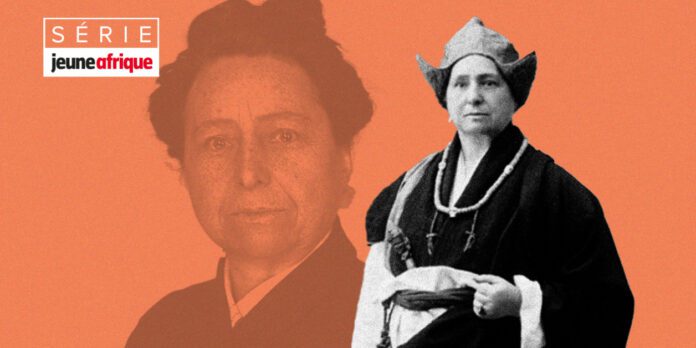
THE MAGREBIAN DREAM OF EUROPEAN ADVENTURERS (2/4) – Supported by the note from City of Naples, who left Tunis on August 9, 1911, Alexandra David-Néel intends to return there within ten months, as she promised her husband, Philippe, who would watch her from the pier. She would not see him again until fourteen years later.
This trip to India would become a trip that would also take her to Sikkim, Nepal, Tibet, Setchuan and Indochina, and which would become famous when she published, in 1927, A Parisian's trip to Lhasa. Its story is that of a façade: the first Europe to enter Lhasa, the capital of Tibet, bypasses the ban on access to foreigners dressed as beggars on pilgrimage. A feat that places this feminist among the adventurers of the 20th century.
But we go back to 1911. On this dock crushed by the summer heat, Philippe has no idea what fate awaits his wife. But he knows her independent character and her attraction to Asia. He had even gotten used to her going out: less than a week after their wedding, in 1904, she had embarked to attend professional meetings in France, Belgium and Switzerland.
With time and the persuasion that “Moumi”, as he called her, knew so well, Philippe learned patience. He will remain her husband – and financier – for life. on one woman who lived her greatest adventure far from him, in Tibet. They will share an infinite number of questions and emotions through a correspondence that will cement this singular love, maintained with intelligence and tenderness.
Singer with the soul of an explorer
These two, however, should never have met. He, a brilliant Centralian, very serious director of the Tunisian railways, has every Proustian character, charming and charming, an intellectual epicure with a touch of melancholy, an innate sense of worldliness and a consummate art of seduction.
She, a feminist who studied philosophy and oriental languages, libertarian, freemasonry, writer, Buddhist, always ready to go and who stated that adventure was the only reason for her life. Daughter of a republican friend of Victor Hugo who went into exile in Brussels, she is also a popular opera singer. The income she will receive from her activity as a singer will allow her to dedicate herself to research, particularly on Buddhism and mysticism, and prepare her departure for “those countries where light is born”. Alexandra has always felt like an explorer at heart.
Born in Saint-Mandé, having difficulty dealing with Paris, she has already made two trips to India and returned from a tour of Asia – under the name Alexandra Myrial – when the Tunis Municipal Opera met her to perform on their stage. The invitation arrives at the right time and will allow you to gain a life. Even better: he was invited to take over the musical direction of the Casino de Tunis, on the site of the current Théâtre de la ville. She therefore extends her stay in Tunisia and continues her singing tours.
The meeting with Philippe Néel
It was during a dinner, in September 1900, that a young man (he would have been 32 years old) met Philippe Néel. Alexandra immediately falls under the spell of this seducer known for leading his conquests aboard his sailboat, swallowand whom she quickly nicknames “Monsieur Nouchy”, when he is not “my alouch” (my sheep in Arabic) in honor of his curly hair.
It is this case, after this marriage and this moment spent in Tunis that provoked the metamorphosis of the adventurers, giving rise to Alexandra David-Néel whose writings still inspire her many readers today. During this period, he focused on the essentials, made Buddhism and feminism his foundations, took esoteric reflections like those of the Rosicrucians and gave himself time to become a journalist, to publish, to sharpen his senses, an observation and I like to travel, enough to refine your projects and be tormented by the desire to leave.
Alexandra was 36 years old when the couple got married. A piece of film, taken from an unknown camera, shows her wearing an orange flower crown surrounded by a tulle veil, too small on her large white crinoline on Philippe's arm. The groom's best man, Doctor Joseph-Charles Mardrus, famous translator of One Thousand and One Nights, stays by your side. The outdated sequence gives a real dimension to this couple who will not have children, according to Alexandra's wishes, and will experience the peak of their relationship through an exceptional epistolary exchange.
Philippe's friends are not his, they are his parents, and the rather mundane life they lead is not what Alexandra aspires to. She is used to more intellectual environments where women are not marginalized. Since arriving in 1900, Alexandra has witnessed the establishment of the French protégé who has made Tunis a major construction site in full swing.
But she remains alien to this emotion and the bon ton atmosphere of a small notable with provincial manners. In Tunis, it appears to be set. She wrote to her husband as soon as she arrived in India, where she lived with scholars: “It is a real orgy after the sad intellectual desert that Tunis is for me… Not being able to talk to anyone about studies, about philosophy… Painful torment…”
However, she doesn't forget Tunis, she remembers Colette's number “dancing half-naked” and the everyday jokes. Above all, she is nostalgic for the special lights of Tunisia. On the summits of the Himalayas, she recorded the “charred earth” she found during a foray into southern Africa. Tunisia and Algeria, and from where she returned amazed by the exuberance of the twilights, “the beautiful afternoons in which the bloody sun spreads a triumphant cloak of purple over the old city, while from the top of the minarets, the muezzins, in a sing-song tone, call the faithful to the night prayer. Contrary to the tendency towards orientalism, Alexandra, on the other hand, is not sensitive to local mysticism or Islam.
Memories of Tunisia
She will also write striking lines about the residence she shared with Philippe at 29 rue Abdelwaheb, in Tunis, “a beautiful large house, with courtyard, fountain, arcades, faience tiles, white walls, blue shutters, decorated with Nabeul pottery and carpets of Cairuão.” She particularly appreciated La Mousmée, whose villa made, from 1906, a luminous thebaïde under the foliage of trees surrounded by flowering reeds, in La Goulette, where Philippe moored swallow.
“How lucky we are to live like this in the East with a beautiful house suitable for meditation, a white terrace where the gods can enter and touch with their bare feet without the risk of colliding with the chimneys”, he rejoices. The nostalgic memory of this “sea retreat” will remain alive for a long time for Alexandra, who after all seems to have known more places in Tunisia than friends.

